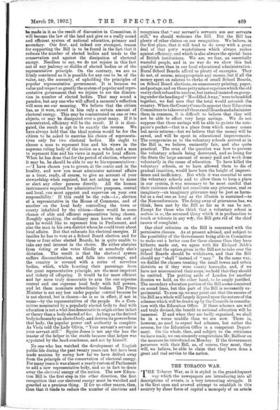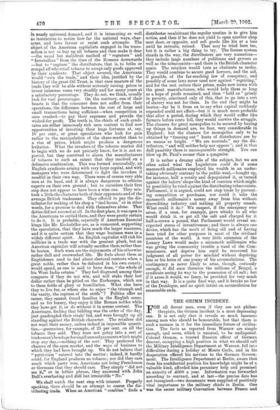THE TOBACCO WAR.
'{"HE Tobacco War, as it is styled in the grandiloquent 1 way which the newspapers are introducing into all descriptions of events, is a very interesting struggle. It is the first open and avowed attempt to establish in this country by sheer force of capital a monopoly of an article in nearly universal demand, and it is interesting as well as instructive to notice how far the national ways, char- acter, and laws favour or resist such attempts. The object of the American capitalists engaged in the trans- action is not to buy up all tobacco and then make it dear —the usual but maladroit method of " regraters " and " forestallers " from the time of the Romans downwards —but to " capture " the distributors, that is, to bribe or compel all who retail tobacco to accept only goods approved by their syndicate. That object secured, the Americans would "own the trade," and their idea, justified by the history of the great Oil Trust, is that once masters of the trade they will be able without seriously raising prices to invest immense sums very steadily and for many years at a satisfactory percentage. They do not, we think, usually look for vast percentages. On the contrary, one of their boasts is that the consumer does not suffer from their operations, the difference between the cost of large and small transactions being sufficient—when competition is once crushed—to pay their expenses and provide the wished-for profit. The truth is, the chiefs of such syndi- cates are either immensely rich men content to find new opportunities of investing their huge fortunes at, say, 10 per cent., or great speculators who look for gain rather to the manipulation of the share-market than to a rise of prices, which might produce a dangerous irritation. What the invaders of the tobacco market did to begin with we do not precisely know, for it is not re- ported, but they contrived to alarm the manufacturers of tobacco to such an extent that they resolved on a defensive combination. This was formed successfully, an English syndicate arising with very large capital, and with managers who were determined to fight the invaders if needful in their own way. There were of course very able men at its head, and it is always dangerous to criticise experts on their own ground ; but to outsiders their first step does not appear to have been a wise one. They mis- took a little the character both of their opponents and of the average British tradesman. They offered to pay the dis- tributor for making of his shop a " tied house," or in other words, for a promise to deal with themselves alone. That device did not succeed at all. In the first place, it was open to the Americans to outbid them, and they were pretty certain to do it. It is probable, especially if American financial kings like Mr. Rockefeller are, as is rumoured, supporting the speculation, that they have much the larger resources, and it is quite certain that they wage business wars in a widely different spirit. An English capitalist will risk his millions in a trade war with the greatest pluck, but an American capitalist will actually sacrifice them rather than be beaten. Such wars are the enjoyments of his otherwise rather dull and overworked life. He feels about them as Englishmen used to feel about electoral contests when a great noble, rather than be defeated in his own county, would spend, as one is said to have done, " the whole of his West India estates." They feel disgraced among their compeers if they do not win, and will stake their last dollar rather than be pitied on the Exchanges, which are to them fields of glory or humiliation. What else have they to live for, or where else to enjoy " the triumph and the vanity, the rapture of the strife " ? Politics offer no career, they cannot found families in the English sense, and as for luxury, they enjoy it like Roman nobles while they have got it, or do without it in serene content. The Americans, finding that bidding was the order of the day, just quadrupled their rivals' bid, and were brought up all standing against the British character. The retailers did not want their money, unless indeed in impossible quanti- ties,—guarantees, for example, of 25 per cent. on all the tobacco they sold. They were not going into a sort of tradesman's bondage for small annual payments which might stop any day,—nothing of the sort. They preferred the chances of the open market, and the ways of business to which they had been brought up. We do not believe that " patriotism " entered into the matter ; indeed, it hardly could, for England produces no tobacco ; nor did they care much which party won, Americans not being Frenchmen or Germans that they should care. They simply " did not see it," or in loftier phrase, they answered with John Bull's everlasting and dull but irresistible "No."
We shall watch the next step with interest. Properly speaking, there should be an attempt to coerce the dis- tributing trade. When an American " combine " finds a
1
distributor recalcitrant the regular routine is togive him notice, and then if he does not yield to open another shop next door, or opposite, and sell goods like his at a loss until he retreats, ruined. That may be tried here too, but it is rather a big thing to try. The license system stands in the way, the distributors are very numerous— they include large numbers of publicans and grocers as well as the tobacconists—and there is the British character again. The retailers would turn as obstinate as mules. They would combine to secure good lawyers, and the aid, if possible, of the far-reaching law of conspiracy, and possibly of some laws never used now against " regrating," and for the rest reduce their prices, make new terms with the great manufacturers, who would help them so long as a hope of profit remained, and then " hold on " grimly in poverty, convinced only of this, that to go into a sort of slavery was not for them. In the end they might be beaten—far be it from us to say what capital recklessly expended could not effect—but it is much more probable that after a period, during which they would suffer like farmers before rents fell, they would survive the struggle. The chances for great monopolies to be secured by buying up things in demand are, we fear, very considerable in England ; but the chances for monopolies only to be obtained by " freezing out " hosts of distributors are by no means so bright. " We are neutrals," say the dis- tributors, " and will neither help nor oppose "; and in that dull passivity there is unconquerable strength. You can blow up St. Paul's sooner than a quagmire.
It is rather a dreamy side of the subject, but we are often asked what the Legislature could do if some mammoth millionaire employed his wealth in an under- taking obviously contrary to the public weal,—bought up, for instance, half a county and depopulated it, or turned against the bakers' shops the kind of coercion which might by possibility be tried against the distributing tobacconists. Parliament, it is argued, could not stop trade by prevent- ing competition or purchases, nor could it take the mammoth millionaire's money away from him without discrediting industry and making all property unsafe. What could it do ? We suspect, if the emergency ever arose, if a man, for example, gave whisky to all who would drink it, or got all the salt and charged for it half-a-crown a pound, that Parliament would reveal un- expected stores of inventiveness ; and there is always one device, which has the merit of being old and of having been tried for other purposes in most of the civilised countries of the world. A very little extension of the Lunacy Laws would make a mammoth millionaire who was giving the community trouble a ward of the Com- missioners, and deprive him until he recovered his judgment of all power for mischief without depriving him or his heirs of one penny of his accumulations. The contingency is never likely to arise, though, curiously enough, it did once threaten the millions of Bengal, a syndicate seeing its way to the possession of all salt; but if it arose it would, we fancy, be provided for very much in that way. It is a quite final way, and it breaks no law of the Decalogue, and no spirit intent on accumulation for reasonable ends.







































 Previous page
Previous page